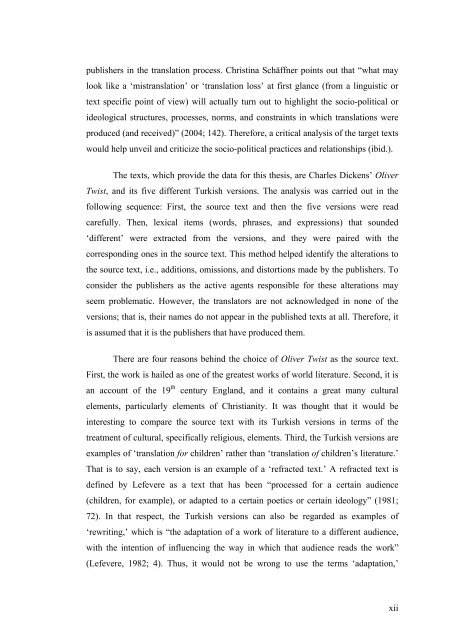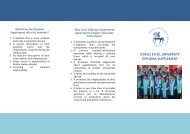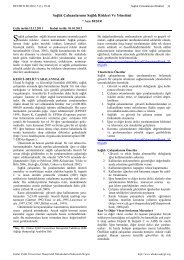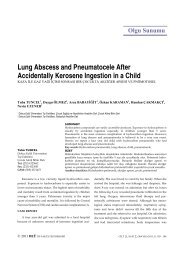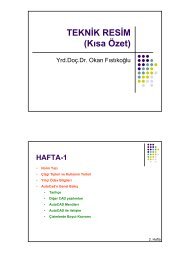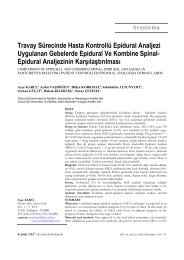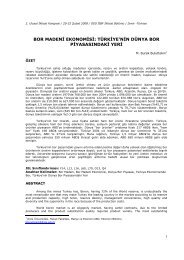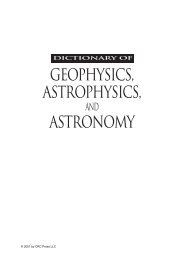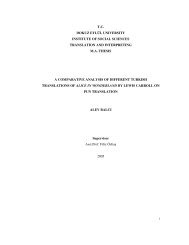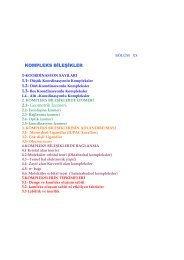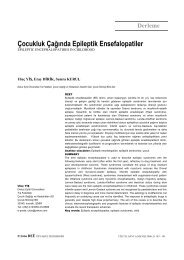the ideology of lexical choices in the turkish translations of oliver twist
the ideology of lexical choices in the turkish translations of oliver twist
the ideology of lexical choices in the turkish translations of oliver twist
You also want an ePaper? Increase the reach of your titles
YUMPU automatically turns print PDFs into web optimized ePapers that Google loves.
publishers <strong>in</strong> <strong>the</strong> translation process. Christ<strong>in</strong>a Schäffner po<strong>in</strong>ts out that “what may<br />
look like a ‘mistranslation’ or ‘translation loss’ at first glance (from a l<strong>in</strong>guistic or<br />
text specific po<strong>in</strong>t <strong>of</strong> view) will actually turn out to highlight <strong>the</strong> socio-political or<br />
ideological structures, processes, norms, and constra<strong>in</strong>ts <strong>in</strong> which <strong>translations</strong> were<br />
produced (and received)” (2004; 142). Therefore, a critical analysis <strong>of</strong> <strong>the</strong> target texts<br />
would help unveil and criticize <strong>the</strong> socio-political practices and relationships (ibid.).<br />
The texts, which provide <strong>the</strong> data for this <strong>the</strong>sis, are Charles Dickens’ Oliver<br />
Twist, and its five different Turkish versions. The analysis was carried out <strong>in</strong> <strong>the</strong><br />
follow<strong>in</strong>g sequence: First, <strong>the</strong> source text and <strong>the</strong>n <strong>the</strong> five versions were read<br />
carefully. Then, <strong>lexical</strong> items (words, phrases, and expressions) that sounded<br />
‘different’ were extracted from <strong>the</strong> versions, and <strong>the</strong>y were paired with <strong>the</strong><br />
correspond<strong>in</strong>g ones <strong>in</strong> <strong>the</strong> source text. This method helped identify <strong>the</strong> alterations to<br />
<strong>the</strong> source text, i.e., additions, omissions, and distortions made by <strong>the</strong> publishers. To<br />
consider <strong>the</strong> publishers as <strong>the</strong> active agents responsible for <strong>the</strong>se alterations may<br />
seem problematic. However, <strong>the</strong> translators are not acknowledged <strong>in</strong> none <strong>of</strong> <strong>the</strong><br />
versions; that is, <strong>the</strong>ir names do not appear <strong>in</strong> <strong>the</strong> published texts at all. Therefore, it<br />
is assumed that it is <strong>the</strong> publishers that have produced <strong>the</strong>m.<br />
There are four reasons beh<strong>in</strong>d <strong>the</strong> choice <strong>of</strong> Oliver Twist as <strong>the</strong> source text.<br />
First, <strong>the</strong> work is hailed as one <strong>of</strong> <strong>the</strong> greatest works <strong>of</strong> world literature. Second, it is<br />
an account <strong>of</strong> <strong>the</strong> 19 th century England, and it conta<strong>in</strong>s a great many cultural<br />
elements, particularly elements <strong>of</strong> Christianity. It was thought that it would be<br />
<strong>in</strong>terest<strong>in</strong>g to compare <strong>the</strong> source text with its Turkish versions <strong>in</strong> terms <strong>of</strong> <strong>the</strong><br />
treatment <strong>of</strong> cultural, specifically religious, elements. Third, <strong>the</strong> Turkish versions are<br />
examples <strong>of</strong> ‘translation for children’ ra<strong>the</strong>r than ‘translation <strong>of</strong> children’s literature.’<br />
That is to say, each version is an example <strong>of</strong> a ‘refracted text.’ A refracted text is<br />
def<strong>in</strong>ed by Lefevere as a text that has been “processed for a certa<strong>in</strong> audience<br />
(children, for example), or adapted to a certa<strong>in</strong> poetics or certa<strong>in</strong> <strong>ideology</strong>” (1981;<br />
72). In that respect, <strong>the</strong> Turkish versions can also be regarded as examples <strong>of</strong><br />
‘rewrit<strong>in</strong>g,’ which is “<strong>the</strong> adaptation <strong>of</strong> a work <strong>of</strong> literature to a different audience,<br />
with <strong>the</strong> <strong>in</strong>tention <strong>of</strong> <strong>in</strong>fluenc<strong>in</strong>g <strong>the</strong> way <strong>in</strong> which that audience reads <strong>the</strong> work”<br />
(Lefevere, 1982; 4). Thus, it would not be wrong to use <strong>the</strong> terms ‘adaptation,’<br />
xii


